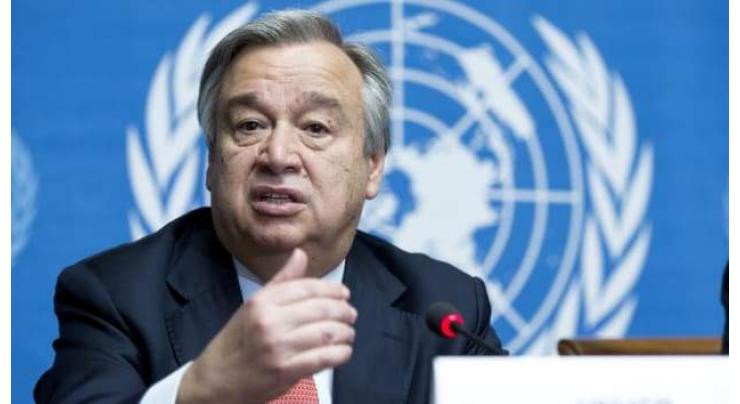
Cyprus Rivals In Geneva As UN Seeks 'common Ground'
Fahad Shabbir (@FahadShabbir) Published April 27, 2021 | 11:45 PM

The UN chief kicked off informal talks with rival Cypriot leaders in Geneva on Tuesday seeking common ground that could help resolve the decades-old dispute
Geneva, (APP - UrduPoint / Pakistan Point News - 27th Apr, 2021 ) :The UN chief kicked off informal talks with rival Cypriot leaders in Geneva on Tuesday seeking common ground that could help resolve the decades-old dispute.
The United Nations is trying to mediate a deal for the divided island, almost six decades since it first deployed peacekeepers.
UN Secretary-General Antonio Guterres has travelled to Geneva to oversee the three days of talks in various formats, four years after the last round of talks collapsed.
"The secretary-general is realistic," his spokesman Stephane Dujarric told reporters in Geneva before the talks began.
"This is an issue that he knows well. He has participated in discussions before. So he is realistic." The spokesman stressed the "informal" nature of the talks, which he said aim "to determine whether a common ground exists for the parties to negotiate a lasting solution to the Cyprus issue within a foreseeable horizon." The UN announced shortly after 4:00 pm (1400 GMT) that Guterres had begun a first meeting with Turkish Cypriot leader Ersin Tatar.
That would be followed by a meeting between the UN chief and Greek Cypriot leader Nicos Anastasiades, and in the evening Guterres "will host a reception for the heads of delegations," the UN said.
Turkey has also been invited to the latest talks, along with Greece and Britain -- the three guarantors of the island's 1960 independence -- which are all represented by their foreign ministers.
- Divided since 1974 - Cyprus has been divided since 1974, when Turkey occupied the northern third in response to a coup orchestrated by an Athens-backed junta seeking to annex the island to Greece.
The Turkish-occupied zone later declared independence, but remains heavily dependent on Ankara.
A UN-controlled buffer zone separates the breakaway state from areas controlled by EU member the Republic of Cyprus.
According to Greek Cypriot authorities, the conflict has cost some 3,000 lives, left 1,400 people missing and displaced thousands from their homes.
Negotiations for a solution have repeatedly failed, with the last round stalling in 2017.
Those talks, held in Switzerland, had aimed to secure reunification in a federation.
But they floundered over the withdrawal of tens of thousands of Turkish troops and over Ankara's status as a guarantor power.
And since then, several factors have added to the traditional sticking points over security guarantees, political equality, territorial adjustments and refugees' property rights.
Obstacles to the process include rising tensions in the eastern Mediterranean over conflicting claims to offshore oil and gas involving Cyprus, Greece and Turkey.
The term "decentralised federation" has meanwhile found its way into Greek Cypriot leader Nicos Anastasiades' lexicon -- something his critics call a "confederation in disguise" as sought by the Turkish Cypriots.
Speaking in a plane en route to Geneva on Tuesday, Anastasiades said this week's talks are "crucial".
He said his delegation enters them with "determination and political will", and is eager to find a way to "restart substantive negotiations." "I hope the other side will come with the same will and the same evaluation, because any diversion will not only be at the expense of the Greek Cypriots, but also to the detriment of the Turkish Cypriots," he said.
- 'New vision for Cyprus' - But after decades of negotiations based on the idea of reunifying the island through the creation of a Federal state, the Turkish Republic of Northern Cyprus (TRNC) is now advocating for that approach be abandoned in favour of a two-state solution.
Tatar, who was elected in October, said in a statement Saturday he was going to Geneva with "a new vision for Cyprus," urging the international community to "acknowledge the existence" of two states on the island.
"There can no longer be an agreement on a federal basis," he told reporters at the airport in Northern Cyprus before leaving for the talks.
But he stressed that "a viable, permanent and sustainable agreement based on the cooperation of two equal sovereign states living side by side in Cyprus is possible."
Related Topics
Recent Stories

Currency Rate In Pakistan - Dollar, Euro, Pound, Riyal Rates On 9 May 2024

Today Gold Rate in Pakistan 09 May 2024

IHC adjourns PTI founder, Qureshi's appeal till Thursday

CDWP recommends 3 projects to ECNEC for approval

Tarar assures APNS to resolve issues of newspaper industry

Pakistan urged to capitalize on economic stability, for Tobacco Tax Reforms

N. Macedonia polls set to upend ties with EU neighbours

Croatia's ruling party reaches coalition deal with right wing

Bayern coach Tuchel makes three changes for Madrid showdown

Olympic flame arrives on French soil for Paris Games

Punjab Finance Minister announces expansion of Social Protection Authority's man ..

Kenya inks deal to end doctors' strike
More Stories From World
-
Brazil flooding death toll surpasses 100
15 minutes ago -
S. Korea vows strong Ukraine ties, smooth Russia relations
45 minutes ago -
US forges new 'battery belt' in hopes of electric future
55 minutes ago -
Tokyo shares open higher
1 hour ago -
Nuggets' Jokic scoops third NBA Most Valuable Player award
1 hour ago -
Brazil flooding death toll surpasses 100
1 hour ago
-
Football: South African Premiership results
8 hours ago -
Football: South African Premiership table
8 hours ago -
Fiorentina reach Europa Conference League final
8 hours ago -
Fiorentina reach Europa Conference League final
8 hours ago -
Football: Europa Conference League results
9 hours ago -
Tennis: Rome Open results - 1st update
9 hours ago